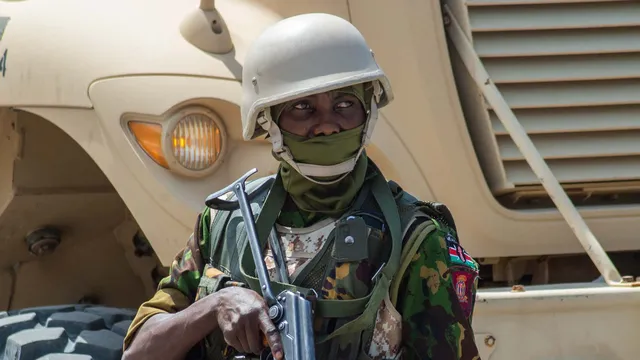
Hunger crisis deepens as gangs threaten Haitian government
2025-04-17 20:46- Haiti is experiencing a significant humanitarian crisis, with over 1 million people displaced due to gang violence.
- Fueled by criminal gangs, the political stability of the transitional government is at risk as they threaten to seize power.
- The urgent need for international support is crucial in addressing the escalating hunger crisis affecting millions of Haitians.
Express your sentiment!
Insights
Haiti finds itself in a dire state as gang violence exacerbates an ongoing humanitarian crisis that has severely affected its population. According to recent reports from the Caribbean Community (CARICOM), more than 1 million citizens are currently displaced, with nearly 60,000 fleeing their homes in just the past month. These conditions are worsened by the rampant control that gangs have over significant portions of the capital, Port-au-Prince, where approximately 90% is under gang influence. The crisis has reached alarming proportions, resulting in food insecurity for over half of the population, with projections estimating that 5.7 million individuals will face severe hunger by June of this year, an increase of more than 300,000 people from the previous year. In the midst of this chaos, international bodies, including CARICOM, are sounding alarms regarding the potential for gang-led attempts to overthrow the transitional government, signaling a serious governance threat. Recent statements from key CARICOM leaders highlight the involvement of criminal organizations in destabilizing efforts aimed at undermining the ongoing Kenya-led multinational security support mission, which the United States backs as a crucial measure to restore stability. The United States has reiterated its commitment to supporting the transitional government amid growing lawlessness, but the humanitarian needs continue to escalate at an alarming rate. The deteriorating situation is not just a political issue; it has dire humanitarian implications. Reports indicate that around 8,400 individuals living in makeshift shelters are at risk of starving, as food and essential aid become increasingly scarce. With past administrations reducing international aid and the prevalence of corruption within local law enforcement, the cycle of violence, poverty, and hunger appears to be spiraling ever further out of control, affecting women and children disproportionately. Local families, like that of Jackie Jean-Jacques, illustrate the harsh reality of life in Haiti amidst this chaos. Having lost their home to gang violence, they reside in a crowded makeshift shelter with limited food options, often forcing their children to survive on minimal sustenance. One report states that malnutrition is rampant among children, with UNICEF highlighting that one in four children in the nation faces food insecurity, posing long-term implications for the country’s future generation. The situation calls for urgent actions from the global community to address both the ongoing violence and the unacceptable levels of hunger faced by Haitians today.
Contexts
The ongoing humanitarian crisis in Haiti continues to escalate in 2025, marked by a combination of natural disasters, political instability, and socioeconomic challenges that have profoundly affected the population. After a series of devastating earthquakes, hurricanes, and persistent drought conditions, the country finds itself struggling to recover while facing continuous threats to public health, food security, and access to essential services. The deterioration of infrastructure exacerbated by natural calamities has significantly hampered the delivery of aid and the functionality of critical facilities, including hospitals and schools, leading to increased vulnerability among the Haitian people, particularly women and children who bear the brunt of these crises. In addition to these environmental challenges, Haiti is plagued by political turmoil, with ongoing gang violence and civil unrest further destabilizing the nation. The absence of a strong governance framework has created a power vacuum that criminal organizations have exploited, leading to rampant insecurity and fear among the populace. As officials struggle to restore order and governance, humanitarian organizations face significant obstacles in their efforts to provide much-needed assistance, with many staff members unable to reach vulnerable populations due to violence and risks associated with operating in these environments. Food insecurity remains one of the most pressing issues in this humanitarian crisis, with recent reports indicating that millions of Haitians are currently experiencing acute hunger. The combination of poor agricultural yields, disrupted supply chains, and rising food prices has created a dire situation where access to basic nutrition is diminishing. International aid is critical at this juncture, but the ongoing instability has resulted in delays and limitations in shipping and distribution, further compounding the situation. Emergency response plans must address both immediate food aid and long-term agricultural recovery to ensure sustainable solutions. In conclusion, the humanitarian crisis in Haiti requires urgent attention and a multi-faceted approach to alleviate the suffering of millions. The amalgamation of natural disasters, systemic political issues, and severe food insecurity underscores the critical need for an international coordinated response. Engaging local leaders, strengthening governance structures, and ensuring safe access for humanitarian efforts will be imperative to effectively address the challenges faced by the Haitian people. As 2025 progresses, it is crucial that the global community prioritizes Haiti amid its growing vulnerabilities and commits to supporting the nation in its journey toward rehabilitation and stability.